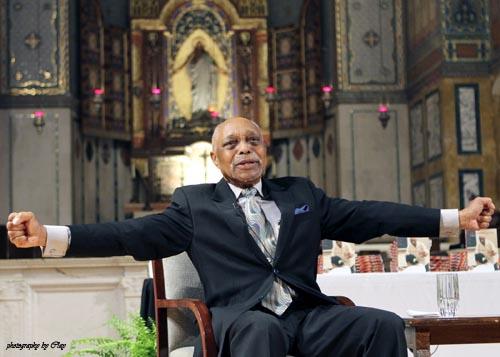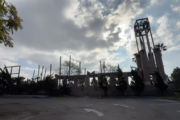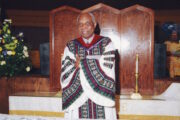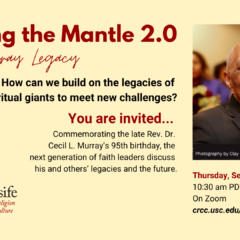Rev. Dr. Cecil “Chip” Murray has appeared in national and local news stories regarding the 20th anniversary of the Los Angeles civil unrest.
Twenty years ago this month, over a thousand fires burned in the heart of Los Angeles. The acquittal of police officers charged in the Rodney King brutality trial had sparked one of the most destructive episodes of urban violence in U.S. history. In the weeks leading up to the verdict, Dr. Murray used his connections with civic, religious and business leaders to lay the groundwork for strategies to quell the rage he knew an acquittal might unleash. When his worst fears were realized, he stepped into the fray to conciliate between rioters and police, and in the aftermath of the riots he worked ceaselessly to address the social and economic ills that had spawned the unrest.
After retiring from his post as pastor of First African Methodist Episcopal Church (FAME), Rev. Dr. Cecil “Chip” Murray was named a senior fellow of the USC Center for Religion and Civic Culture. He was also appointed as the John R. Tansey Chair of Christian Ethics in the School of Religion at the University of Southern California.
- Dean Varun Soni interviewed Rev. Murray for Huffington Post. They discussed First AME’s response to the riots and the role of the black church today.
- In an article looking back at the uprising, Murray told Reuters that he has seen enough improvement in the police mentality to give him hope for the future.
- The Associated Press mentioned Murray’s recollection of “150 volunteers fanned out across the city, urging calm.”
- NBC Nightly News interviewed Rev. Murray about his experience during the riots. “When I went outside the church…an inferno; it was hell.”
- NBC Los Angeles featured Murray in a look back at what three “calm voices” did during the 1992 civil unrest. Murray took to the pulpit, and Edward James Olmos, also included in the news story, picked up a broom.
- The LA Times quoted Murray on his belief that the riots were the result of the actions of “only a few bad apples, only a few punks, gang members” — Murray pointed to the discontent engendered by disparity and disadvantage.
- Annenberg TV News interviewed Murray on the racial tensions of the civil unrest.
- KCRW interviewed Murray in a podcast that asks, “Who Is LA, Twenty Years after the Riots?” How did it shape the city we know today? How did it shape our perceptions about the most diverse metropolitan center in the United States, perhaps in the world?
- The California Health Report discusses the semantics of the event in 1992 – some people say “riots,” Murray prefers “civil unrest.” Cecil Murray Center executive director Rev. Mark Whitlock was also quoted, saying another uprising is unlikely to occur.
- Neon Tommy, an online publication of the Annenberg School for Communication & Journalism, interviewed Murray about how the country and LA has grown – or not – in its attitudes regarding race since 1992 and regarding Rebuild L.A.’s attempts to revive the city.
- USC’s Dornsife featured Murray in a video, in which he discusses what drew him to the ministry, the 1992 Los Angeles uprising and what he hopes to give back.
- The PBS SoCal program SoCal Insider with Rick Reiff included an interview with Murray about the riots and improvements within the police department since 1992.
- Murray reflected on the uprising with the Los Angeles Wave.
- In a release on PR Newswire, Murray was announced as a co-chair of Operation HOPE’s Opportunity Bus Tour – From Chaos to Community in Los Angeles with community and corporate partners – including respected entertainers, public servants and business leaders – and the release of the Quincy Jones Celebrity Edition financial literacy curriculum.






